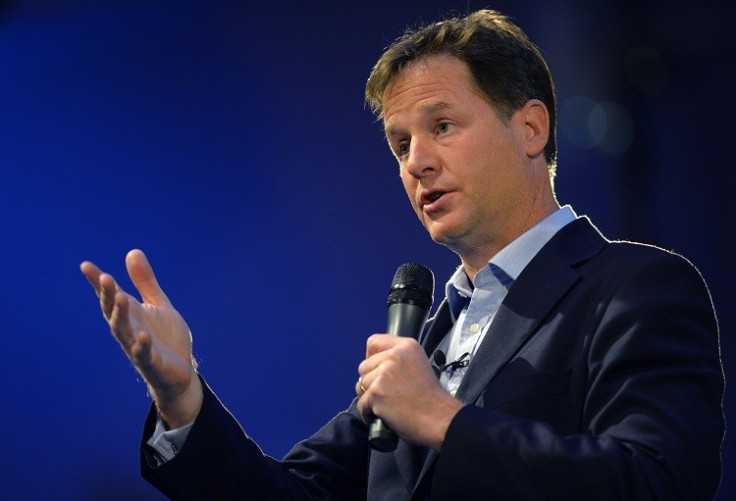Why Ed Miliband's Labour Despises Nick Clegg's Liberal Democrats

Deputy Prime Minister Nick Clegg's attempts to position the Liberal Democrats for a possible coalition with Labour after the next election have met with a blunt rejection from Ed Miliband.
Now it is rumoured Labour is even targeting Clegg in his Sheffield constituency in a bid to see him thrown out of parliament at the election.
The reality, of course, is that this is all just pre-election mischief making and, in the event of a hung parliament, it is expected Labour will swallow hard and consider doing a deal with the Lib Dems if that is what is required to rule.
But will they really? One of the givens of British politics is that Labour activists and MPs detest the Liberal Democrats with a special kind of hatred that doesn't extend to their natural enemies, the Tories.
It was an often-overlooked factor, if not the decisive one, in the failure to do any deal between Gordon Brown and Clegg in 2010 with senior figures including John Prescott, John Reid, Alan Johnson, David Blunkett and former leader Neil Kinnock amongst those resisting deals.
The argument goes that at least you know where you stand with the Tories whereas the Lib Dems and their predecessors the Liberal Party and the SDP are duplicitous, dirty and unprincipled.
The hatred runs deep and goes back many decades. It is possible to claim it started at the beginning of the last century with suggestions that the two parties were both broadly of the left and, to coin a phrase, if the parties had united they would never have been defeated.
That is just what Tony Blair attempted with his failed "project" in 1997 and revelations he was having secret talks with Lib Dem leader Paddy Ashdown to give him cabinet seats in return for a "realignment of British politics" infuriated many in Labour who view the Lib Dems as treacherous splitters.
There is also the history of official and unofficial deals between the two parties, most importantly the Lib-Lab pact between March 1977 to October 1978 when Jim Callaghan's Labour government was kept in power by the old Liberal party. That ended in acrimony amid claims and counter claims about who had stitched up whom.
There was far worse to come in 1981, though, when the "Gang of Four" senior Labour figures broke away from the party in protest at what they saw as its far-left drift and created the short-lived but briefly popular Social Democratic Party.
The move represented the biggest split ever seen in Labour ranks with critics claiming it helped keep Margaret Thatcher's Tories in power and pitched Labour into an ideological crisis from which it has never recovered.
When the SDP failed and drifted towards obscurity, the "traitors" joined with the Liberals to form the current Liberal Democrats.
It is now argued that the spirit of the SDP is alive and well in the so-called "Orange Book" Lib Dems, those MPs including coalition members Nick Clegg, David Laws and Vince Cable who in 2004 contributed to a volume of essays on a more free-market orientated vision for the party's policy direction, seen as a move away from the more centre-left stand of the party to a more centre-right ideology.
We're not fighting the next election so that we can ask the party who helped push through David Cameron's top-down NHS reorganisation to help us reverse it.
Apart from all that history, there is also deep animosity towards the Liberal Democrats over their campaigning techniques with routine claims they are the dirtiest, most unprincipled fighters on the ground.
The party's image of pretending to be centre-right in Tory areas and centre-left in Labour regions is not just about doorstep campaigning, it is part of the Liberal Democrat strategy.
One often repeated example of dirty campaigning is the way current LibDem minister Simon Hughes campaigned against gay Labour candidate Peter Tatchell in the 1983 Bermondsey by-election under the slogan "a straight choice". Hughes repeatedly denied he himself was gay until he was challenged by the Sun newspaper in 2006.
The party's behaviour in coalition with the Tories has done little to end the deep animosity towards them which was summed up by Labour frontbencher Jonathan Ashworth MP who said: "We're not fighting the next election so that we can ask the party who helped push through David Cameron's top-down NHS reorganisation to help us reverse it, or so that we can ask the party who voted to impose the hated bedroom tax to vote with us to scrap it, or so that we can ask the party that cut taxes for millionaires to join us in reintroducing the 50p rate."
So, if Ed Miliband finds himself in the position where a coalition with the Lib Dems in 2015 is the only road to power he may find the old tribalism is a major obstacle.
That, of course, is assuming Miliband would countenance forging a coalition in the first place. And there must be pretty serious doubts about that.
© Copyright IBTimes 2025. All rights reserved.





















